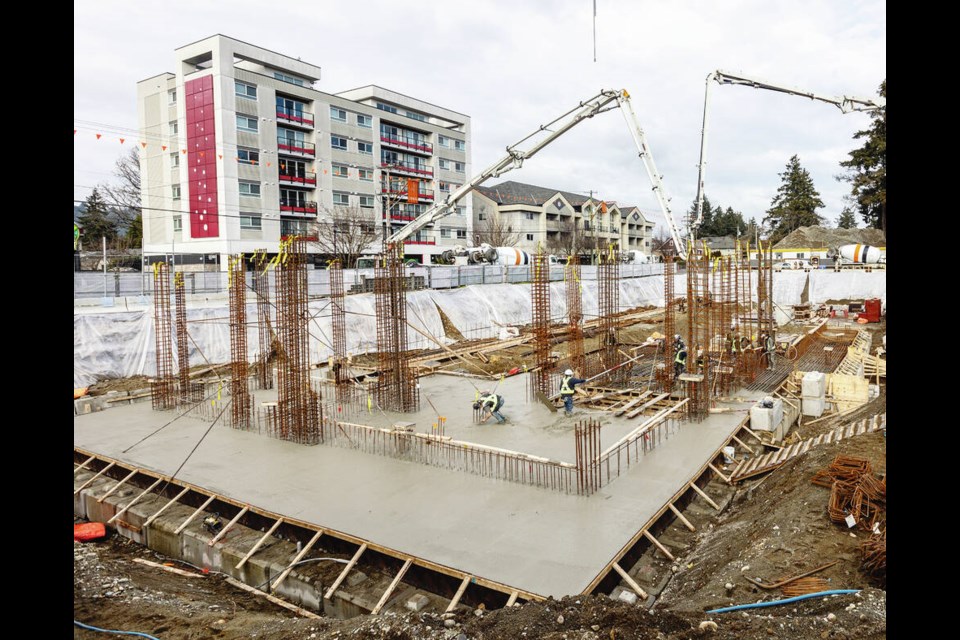About 70 trucks rumbled into downtown Langford over several hours on Wednesday, delivering a specialized concrete to pour the foundation for a unique post-secondary campus on the West Shore.
Butler Concrete & Aggregate poured 600 cubic metres of concrete made with captured carbon dioxide, the initial green step in the $98-million, LEED-certified campus that will be jointly operated by Royal Roads University, the University of Victoria, Camosun College and the Justice Institute of British Columbia.
The five-storey, mass-timber building at the corner of Peatt Road and Goldstream Avenue is expected to be operating by the fall of 2024 with room for between 400 and 600 students. The institutions are planning courses that will be offered. Potential expansions on the site are being considered.
“Just as this campus represents a bright future for students, the building itself represents the standards we need to uphold to create the future,” said Philip Steenkamp, president of Royal Roads University.
“Beginning with a foundation that has these environmental standards built in also conveys the partners’ shared values of innovation, climate-risk adaptation and sustainability.”
Traditional concrete is considered one of the most carbon-intensive construction materials, but the concrete produced by Butler Concrete & Aggregate uses carbon-removal technologies that inject captured CO2 in fresh concrete, where it immediately mineralizes and remains permanently embedded.
The mineralization of carbon improves concrete strength because less cement is required.
Carbon is captured during the cement production process. Cement is the key ingredient in concrete and its production is responsible for about 7% of the world’s carbon dioxide emissions.
Langford became one of the first municipalities in Canada to adopt a low-carbon concrete policy in 2021.
“Carbon cure is the process of adding CO2 as a dry ice to the ready mix concrete,” said Travis Butler of Butler Concrete & Aggregate. “This gives us the ability to use less cement in each metre of concrete produced and lower the environmental impact.”
Butler said his third-generation family business is eager to adopt the technologies in its quest to create a cleaner and greener product.
“This pour today has a 54% lower embodied carbon value than the Canadian national average, and 30% lower embodied carbon value than the B.C. average,” said Butler. “So currently our company is one of the cleanest producers in North America.”
Butler said the pour on Wednesday “will have the savings equivalency of 60 acres of forested land over one year of growth sequestering CO2 emissions.”
The new campus is considered a key project that will make post-secondary education more accessible to students on the West Shore, reduce commute times and remove cars from roads.
The facility includes a $77.8-million investment from the provincial government for construction of the building, and $18.5 million from Royal Roads University for the land purchase and an additional $500,000 for capital costs. Capital spending will also include $1 million from the University of Victoria and $200,000 from Camosun College.
The City of Langford will invest $27.5 million in parking for the campus, as well as road infrastructure upgrades and green spaces, including $1.5 million in funding over 10 years for an Innovation Studio to help incubate new businesses.
“This urban campus will complement the vision for a modern Langford and serve students and residents from all West Shore communities,” said Langford Mayor Scott Goodmanson. “We’re pleased to see Langford’s low-carbon concrete policy at work in such a significant project, helping to reduce emissions and reinforcing the city’s commitment to climate action.”
Several other lots at the site, surrounding the Our Lady of the Rosary Catholic Church along Goldstream Avenue and Peatt Road, have been acquired for the campus. Eventually, the education complex could see up to four buildings of similar size.
The campus is expected to eventually include a performance theatre.
The church building will be torn down after the parish relinquishes the property in September. Our Lady of the Rosary blessed ground for a new church last fall on a seven-acre former turkey farm and processing plant on Irwin Road. The parish has plans for a 500-seat church, 450-seat community hall, gathering rooms and a daycare.
dkloster@timescolonst.com
>>> To comment on this article, write a letter to the editor: letters@timescolonist.com



